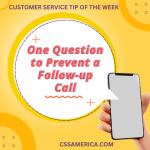
In our constant quest to find new ways to describe boring or irritating processes and services in a way that makes them sound exciting, we develop creative names: No Child Left Behind, Affordable Care Act, Permanent Seat Licenses, etc.
However, the problem is that our customers find out that this is typically not something to embrace, and the name becomes a joke or a punch line.
When we want to sound sophisticated, we use high-brow language: Six Sigma, OnBoarding, Rubric.
However, the problem is that our customers and employees have little-to-no idea what we’re discussing.
And sometimes, when we want to be specific, we risk using terms that mean different things based on the industry: Achievement, Bonding, Delegation, Enrollment, Gatekeeper, Grandfathered, Network, Rehab, Service Area, and Waiting Period.
Does Bonding relate to a mother and child, a company doing business in town, or teeth? Is a Delegation addressing something in healthcare or at the United Nations? Is the Gatekeeper a function in healthcare, a secretary who won’t let you see the boss, or – literally – a gate keeper?
When we use terms, we can’t assume that the customers know the terms. We can’t assume that if it’s used in our industry that the customer knows what “Enrollment” means in healthcare because their only exposure to “Enrollment” was at their child’s school.
The words matter, and we need to make sure the words are simple enough to be understood without requiring a detailed glossary to explain everything.
Go to your company’s website. Look at the patient or fan or employee or customer flyers and handbooks that you distribute. Give access to the website and these documents to people who know nothing about your business; ask them to read the information and interpret what it’s saying.
Make sure the words you use are clear enough to be understood. Simplify the Vocabulary.
Signup for FREE Tips! Contact Us More Resources for You Visit Our Home Page











